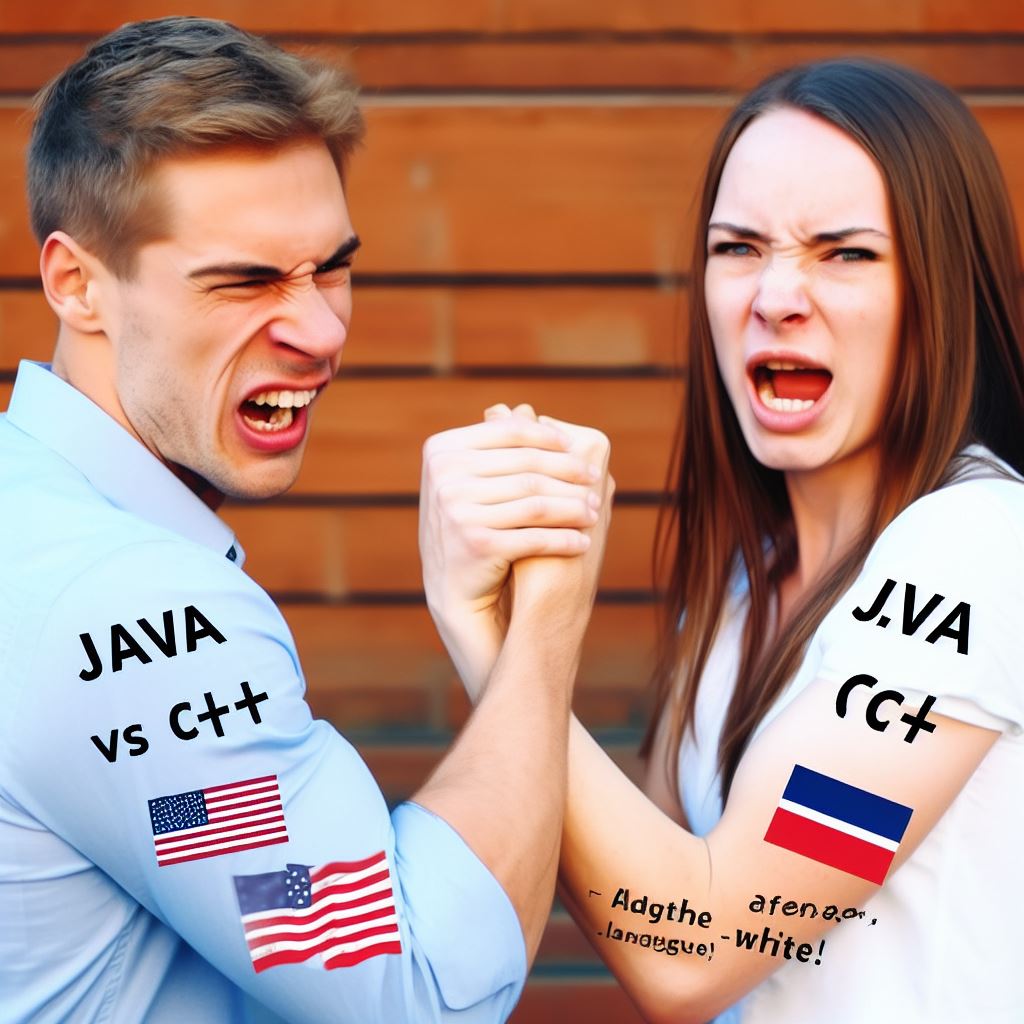Introduction
Brief introduction to the topic of the blog post
In the dynamic universe of programming languages, two titans stand tall—Java and C++.
These languages have earned their stripes and boast passionate communities of developers.
As programmers delve into the intricacies of software development, the rivalry between Java and C++ often sparks spirited debates, comparisons, and playful banter.
Popularity in the Coding Community
Java has long been lauded for its portability, readability, and extensive libraries. It’s a stalwart in enterprise applications and Android app development.
On the other hand, C++, with its powerful features and performance capabilities, is a favorite for system-level programming, game development, and embedded systems.
Exploring the Rivalry Through Memes
This blog post invites you to embark on a journey into the world of programming humor. We’ll explore the age-old rivalry between Java and C++ through the lens of memes.
These memes, created by developers with a penchant for humor and a deep understanding of the quirks of these languages, offer a unique perspective on the ongoing battle for dominance.
Join us as we dissect and chuckle at memes that capture the essence of this rivalry, from debates about memory management to the infamous “Java Virtual Machine” encounters with the “C++ pointers.”
Get ready to enjoy the lighter side of this programming feud, where laughter is the ultimate code compiler.
Background on Java
Information about Java as a programming language
- Java is a high-level, general-purpose programming language.
- It was developed by Sun Microsystems and released in 1995.
- Java is known for platform independence, meaning it can run on any operating system.
- It follows the principles of object-oriented programming, allowing for modular and reusable code.
- Java programs are compiled into bytecode, which can then be executed by the Java Virtual Machine (JVM).
Key features of Java
- Platform independence allows Java programs to run on different devices without recompiling.
- Java has automatic memory management through garbage collection.
- It has a vast library of built-in classes and APIs, making development faster and easier.
- Java supports multithreading, enabling concurrent execution of multiple threads within a program.
- Java’s exception handling allows for better error management and program robustness.
Wide range of applications that use Java
- Android apps: Java is the primary language for Android development.
- Enterprise software: Many large-scale business applications are built using Java.
- Web development: Java Servlets and JavaServer Pages (JSP) are commonly used in web development.
- Scientific applications: Java’s speed and flexibility make it suitable for scientific simulations and data analysis.
- Financial software: Java is widely used in the financial sector for its security and performance.
Common memes that portray Java and its characteristics
- “Write once, run anywhere” meme highlights Java’s platform independence.
- Java being referred to as a “coffee language” due to its name.
- Memes joking about the verbosity of Java code, with its strict syntax and required boilerplate.
- Java’s reputation for being secure and reliable is often portrayed in memes.
- Memes comparing Java to C++ and other languages, often emphasizing Java’s simplicity and readability.
Java’s versatility and wide range of applications have contributed to its popularity among developers.
Despite its rivalry with other programming languages like C++, Java continues to evolve and adapt to changing technology trends.
Through the use of memes, developers express their experiences, frustrations, and humor related to Java’s unique characteristics.
These memes not only entertain but also serve as a form of communication and bonding within the programming community.
Java’s platform independence and object-oriented nature have made it a favorite choice for various industries, including mobile development, enterprise software, and web development.
With its robustness, security, and scalability, Java has proven to be reliable in critical sectors such as finance and scientific research.
The Java community continues to grow, with new frameworks and tools being developed to enhance the language’s capabilities.
Overall, Java’s impact on the software development industry is undeniable, and the rivalry with other programming languages only adds to the vibrant and dynamic nature of the field.
Read: How to Install and Set Up a New Coding Font on VS Code
Background on C++
Some information about C++ as a programming language
C++ is a powerful programming language that was developed as an extension of the C programming language.
It was created by Bjarne Stroustrup in the late 1970s as an improvement over C, with added features and capabilities.
C++ is known for its performance and low-level control, making it a popular choice for projects that require high efficiency and optimization.
It allows programmers to have direct control over system resources and memory management, making it ideal for applications that need to be fast and efficient.
key features, such as performance and low-level control
One of the key features of C++ is its ability to support both procedural and object-oriented programming paradigms.
It enables developers to write code using classes and objects, encapsulating data and behavior within them.
This makes code easier to understand, maintain, and reuse.
Use of C++ in systems programming, game development, and embedded systems
In systems programming, C++ finds extensive use for developing operating systems, device drivers, and software that interfaces with hardware.
It provides a level of control that is required in such applications, allowing developers to manipulate hardware resources directly.
C++ serves as the primary language for building game engines like Unreal Engine and Unity.
It’s also prevalent in embedded systems, which power devices like smartphones, appliances, and automotive systems.
Common Memes Portraying C++
- “C++: Where friends can access your private parts.” This meme highlights one of C++’s features: friend functions, which can access private members of a class.
- “C makes it easy to shoot yourself in the foot; C++ makes it harder, but when you do, it blows away your whole leg.” This meme humorously points out that while C++ offers more safety features than C, it can still lead to complex bugs and errors.
- “C++: I’m going to divide and conquer.” This meme plays on C++’s ability to create software components through classes, allowing developers to divide and conquer complex problems.
- “Me: C++ is easy; Also me: WHY WON’T THIS CODE COMPILE?!” This meme reflects the frustration that can come with writing C++ code, as it can sometimes be challenging to catch and fix compilation errors.
- “C++: The language that takes ‘see a bug, be a bug’ too seriously.” This meme humorously illustrates the concept of undefined behavior in C++, where a small mistake can lead to unpredictable and often humorous results.
These memes capture the nuances of C++ and its programming style, showcasing both its power and its quirks. Despite its complexity, C++ remains a widely used language, valued for its performance, control, and broad application domains.
Read: Coding Software and Cloud Services: A Seamless Blend
Tech Consulting Tailored to Your Coding Journey
Get expert guidance in coding with a personalized consultation. Receive unique, actionable insights delivered in 1-3 business days.
Get Started
Delve into the Subject: Working with Arrays in Excel VBA: An Introduction
Comparison of Java and C++
Java and C++ are both popular programming languages, but they have significant differences in terms of syntax, performance, memory management, and usage.
These differences have fueled a long-standing rivalry between the two languages.
In this section, we will explore the similarities and differences between Java and C++, compare their syntax, performance, memory management, and usage, and highlight areas where each language excels.
Similarities between Java and C++
- Object-oriented programming: Both Java and C++ support object-oriented programming paradigms, allowing developers to use classes, objects, and inheritance.
- Strongly typed: Both languages enforce strong typing, meaning that variables must be explicitly declared and adhere to their data types.
- Extensive standard libraries: Both Java and C++ come with vast standard libraries that provide pre-written code for common tasks, making development faster and easier.
- Exception handling: Java and C++ provide similar mechanisms for handling exceptions, allowing developers to catch and handle errors gracefully.
Differences between Java and C++
- Syntax: Java has a simpler syntax compared to C++, making it easier to learn for beginners. C++ has a more complex syntax that allows for low-level programming.
- Performance: C++ is generally considered faster than Java because it is a compiled language, while Java is an interpreted language. However, Java’s Just-In-Time (JIT) compiler can optimize performance at runtime.
- Memory management: Java has automatic memory management through garbage collection, while in C++, memory management is manual, requiring developers to allocate and deallocate memory explicitly.
- Usage: Java is commonly used for building enterprise-level applications, web applications, and Android apps, while C++ is often used in systems programming, game development, and embedded systems.
- Platform independence: One of the key advantages of Java is its platform independence. Java programs can run on any platform with the Java Virtual Machine (JVM). C++ programs, on the other hand, need to be recompiled for each target platform.
Areas where Java excels
- Portability: Java’s “write once, run anywhere” approach allows developers to write code once and run it on any platform that supports the JVM.
- Memory management: Java’s garbage collector automatically manages memory, reducing the chances of memory leaks and making it easier to develop robust and scalable applications.
- Safety: Java includes many built-in safety features, such as null pointer checks, array bound checks, and exception handling, making it less prone to errors and crashes.
- Large ecosystem: Java has a vast ecosystem with numerous frameworks, libraries, and tools, making it easier for developers to build complex applications.
Areas where C++ stands out
- Performance: C++ enables developers to write highly optimized code that can directly interact with hardware, making it a preferred choice for performance-critical applications.
- Low-level programming: C++ allows developers to access and manipulate memory directly, enabling them to write code at a lower level than Java.
- Resource-constrained systems: C++ is often used in embedded systems and resource-constrained environments where efficiency is crucial.
- Compatibility with existing C code: C++ is an extension of C, which makes it compatible with existing C code. This compatibility provides access to a vast collection of libraries and tools.
The rivalry between Java and C++ is not necessarily the result of one language being superior to the other.
Passionate debates among developers stem from differences in syntax, performance, memory management, and usage, not by mere coincidence.
Both Java and C++ have their strengths and weaknesses, and the choice between them ultimately depends on the project requirements, performance needs, and developer preferences.
Read: Kotlin for Android: Google’s Preferred Language
Java vs C++ Memes
In the realm of programming languages, few rivalries are as amusing and enduring as the one between Java and C++.
Developers on both sides have created a plethora of memes that cleverly capture the humor and underlying stereotypes associated with these languages.
This blog section will showcase a collection of memes that highlight the rivalry between Java and C++, providing a deeper understanding of their differences and the laughter they bring to the developer community.
Showcaseing a collection of memes that highlight the rivalry between Java and C++
1. Syntax Showdown
- What do you mean “System.out.println” instead of “cout”? Java, we need to talk.
- Who needs semicolons when you can just forget them in Java and watch the chaos unfold?
2. Memory Management Mayhem
- Garbage Collector in Java be like: “Here today, gone tomorrow! Wait, where did that object go?”
- C++ pointing fingers at Java’s Garbage Collector while manually managing memory like a boss.
3. Performance Pretense
- Java saying, “I might be slower, but at least I am platform-independent.” C++ responds with, “Speed is everything, my friend.”
4. Exceptional Exception Handling
- C++ developers using “try-catch” while Java programmers prefer “try-catch-finally” for their exception extravaganza.
The popularity of these memes among developers is a testament to the lighthearted nature of the rivalry.
It serves as a way for programmers to bond over shared experiences and poke fun at the idiosyncrasies of the languages they work with.
These memes have become a virtual language of their own, allowing developers to engage in friendly banter and showcase their wit.
Analyzeing a few memes to provide a deeper understanding of the rivalry and the underlying stereotypes associated with each language
Now let’s dive deeper into a few memes to unravel the underlying stereotypes associated with Java and C++:
- Stereotype 1: Java is for beginners, C++ is for the elite.
Meme: “Java developers be like – ‘I love OOP and coffee.’ C++ developers be like – ‘I love OOP, pointers, and headache medicine.’”
Many hold the stereotype that Java serves as an initial programming language due to its simplicity, while experienced developers favor C++ for its low-level programming and memory management intricacies. - Stereotype 2: Java sacrifices performance for portability.
Meme: “Java developers watching C++ folks optimizing their code for speed – ‘I wouldn’t understand the need for speed; I’m too busy writing platform-independent code.’” Java’s “write once, run anywhere” mantra has made it the language of choice for cross-platform development.
This stereotype implies that Java may prioritize portability over performance, in contrast to C++, celebrated for its speed and efficiency. - Stereotype 3: C++ struggles with memory management, while Java handles it flawlessly.
Meme: “Java developers watching C++ programmers juggle with pointers: ‘Are you guys having memory issues? I can help with that!’”
Java’s automatic memory management, handled by the Garbage Collector, often leads to the belief that it eliminates memory-related bugs and makes developers’ lives easier.
Meanwhile, C++ developers are seen as brave warriors battling the intricacies of manual memory management for the sake of flexibility and control.
Read: Google Blockly: Coding for Kids Made Easy
Conclusion
The rivalry between Java and C++ as depicted by memes is humorous and entertaining.
Both languages have their own strengths and areas of application.
Despite the rivalry, it is important to appreciate the humor and enjoy the memes while recognizing the value of both Java and C++.
Java is known for its platform independence and robustness, making it perfect for developing scalable and secure applications.
On the other hand, C++ is a powerful language that offers low-level control and is widely used in game development and system programming.
Rather than being caught up in the rivalry, it is important to appreciate the uniqueness and strengths of each language.
Both Java and C++ have contributed significantly to the field of programming and have their own loyal communities of developers.
So, next time you come across a Java vs C++ meme, take a moment to enjoy the humor while appreciating the contributions of both languages.
And if you have any favorite memes, feel free to share them with us! Let’s continue to celebrate the rivalry while recognizing the value of both Java and C++.




